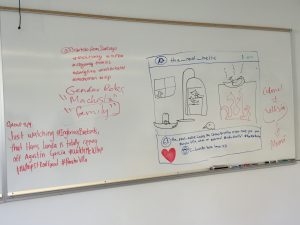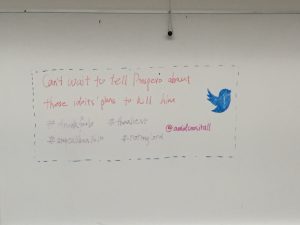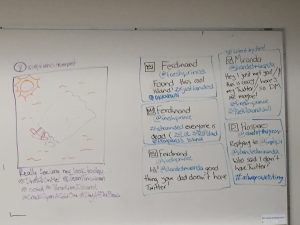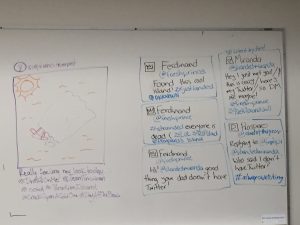ArtsONEb is an invitation to unpack why “authority and resistance” has concerned some of the most noteworthy thinkers and revolutionary actors of the past and defined recent thematic trends in the arts, politics, and beyond. It is an opportunity to actively engage in a dialogue – both through conversation and written work in an academic context – about the value of looking to the past to better comprehend present circumstances and even to project future occurrences. See the current course syllabus for my section here: Authority and Resistance Syllabus 2017
Category Archives: Teaching and Learning
History of Courses Taught
The University of British Columbia
First Year Programs, Arts One
- Authority and Resistance
Department of French, Hispanic, and Italian Studies
- Spanish 491 Directed Study on Colonial Literature
- Spanish 405a/505 Latin American Guerrilla Literature
- Spanish 406 Gender Representations in Latin American Literature
- Spanish 401 Translation
- Spanish 365 Introduction to Spanish American Literature (1820s-present)
- Spanish 364 Spanish-American Literature (up to 1820s)
- Spanish 312 Latin American Literature in Translation (Taught in English)
- Exploring Politics through Literature
- Violence: Latin American Testimonial Narrative and Documentary
- Spanish 280: Snapshots of Revolution in Spanish America (Taught in English)
- Spanish 222 Hispanic Cultural Expressions
- Spanish 221 Introduction to Hispanic Literature and Methods of Literary Analysis
- Spanish 202 Intermediate Spanish II
- Spanish 201 Intermediate Spanish I
- Spanish 102 Novice Spanish II
- Spanish 101 Novice Spanish I
The University of Arkansas at Little Rock
Department of International and Second Language Studies
- Spanish 3312 Mass Media and Society in Spanish American Literary and Cultural Texts
- Spanish 4362 From Literature to Film in Spanish American Literature
- Spanish 4361 (Re)Writing Revolution (Latin America)
- Spanish 3335 Culture and Popular Culture of the Americas
- Spanish 3332 Introduction to Hispanic Literature
Michigan State University
The Centre for Integrative Studies in the Arts and Humanities
- IAH 211C Identity Politics and Human Rights in 20th Century Literature on the Revolution
- IAH 203 Latin America and the World
Department of Spanish and Portuguese
- Spanish 310 Basic Spanish Grammar
- Spanish 250 Intensive Review of Intermediate Spanish I & II
- Spanish 202 Second Year Spanish II
- Spanish 201 Second Year Spanish I
- Spanish 150 Intensive Review of Elementary Spanish I & II
- Spanish 102 Elementary Spanish II
- Spanish 101 Elementary Spanish I
Lansing Community College
Department of Communications
- Spanish 121 Elementary Spanish I
- Spanish 116 Conversational Spanish II
Teaching Writing
Presentations
Here, I’ve included a sampling of original class sessions, influenced by inquiry-based teaching methods and other technologies that I have designed for UBC students on different topics, relevant to their coursework and other aspects of their degree programs.
Arts Oneb: Authority and Resistance Lectures and class meetings
- Lecture: Ernest Hemingway and For Whom the Bell Tolls
- Hemingway For Whom the Bell Tolls
- The end of Plato and the Myth of Er
- Antigone 1
Spanish Language and Hispanic Studies Classes
- Spanish 201 Subjunctive in review
- Introducción a la lección 1 Span 201 2018
- 2018 ANÁLISIS ESTRUCTURAL DE LA POESÍA (Span 221)
- Spanish 222 Introduction to Graffiti
- Spanish 221 Federico García Lorca e intro a la Casa de Bernarda Alba
- Introduction to the Cuban Revolution and Cuban Writing
- Spanish 280 Nellie Campobello Men of the North

In the Classroom
My teaching has been informed by a number of methods and approaches and is often enhanced by technology. I primarily employ a Communicative Approach that incorporates other teaching methods such as Jean-Pol Martin’s Learning by Teaching Method and other inquiry-based and collaborative learning models that are complemented by Power Point and Prezi presentations, music and film, discussion-oriented platforms and blogs, podcasts, interactive lecture tools and games. Also, since I have found that learning through reading and writing helps to foster a(n) (inter)disciplinary community in the classroom, my pedagogy actively engages students of all levels in the curriculum with such practices.
The collection of class presentations (PPT) and in-class activities included in this section demonstrate my student-centered and collaborative approach to teaching and learning, which tends to privilege active (rather than passive) learning practices. In my classrooms, students are required to think, answer and pose questions, collaborate regularly with classmates, lead classroom activities (Discussion Leader Sessions), and moderate class discussions both in the classroom and online through a class-based discussion forum. This varied, but highly interactive approach to teaching in general creates a learning environment that promotes the “five C’s” that have greatly contributed to my success as an educator up to this point: communication, context-based learning. cross-cultural and disciplinary connections, community, and comfort – not in the warm, fuzzy way, but in the sense of creating an environment driven by active participation, mutual respect, and an easy expression of ideas.
In-class Assignments and Activities
Language Classes
- Review of Key Phrases and Characters Volver
- SPAN 202 Information Gap Activity Lesson 7 Vocabulario cultural
- Con los ojos cerrados Actividad de dibujar
- Kahoot: Review of the Preterit and Imperfect (Spanish)
Literature and Culture Classes
- Ejercicio dibujando Volver
- Discussion Leader Sessions
- Spanish 364 Debate Activity Las Casas y Sepúlveda
- Kahoot: Spanish 222 Review of “Music” as Cultural Genre
- Warm-up Activity Art and Education

Arts One b: Authority and Resistance
Protected: Assessments and Rubrics
Spanish 406: Gender and the Politics of Space in Spanish America (S. XVII-S. XX)
In SPAN 406, students will evaluate how different Spanish American authors from the 17th – 20th centuries explore the idea of gender as a category of analysis in literature situated in diverse enclosed spaces (the convent, the jail cell, the psychological institution, and others). More specifically, we will evaluate how selected authors promote or move away from the “normative” codes of gender present in society and if and when such codes incorporate and/or compete with other identity categories such as race, class, and ethnicity, and so on. As one of the overarching goals of the course is to engage students in scholarly dialogues on gender, students will explore the construction, performance, and variations of gender through critical and theoretical approaches to the topic and in relation to the literary corpus of the course.
Spanish 280: Snapshots of Revolution in Spanish America
Revolutions challenge the status quo. Revolutionary leaders think differently. They imagine change in times of conflict. Span 280 is an introduction to major icons, concepts, practices, and discourses of revolt and revolution in Latin America from 1910-present. We will read first-hand accounts of “Revolution” written by and about some of the most prevalent rebel leaders – Emiliano Zapata, Che Guevara, Gioconda Belli, Omar Cabezas, and the rebel formerly known as Subcomandante Marcos – while studying the intersections of literary, political, and cultural production (music, art, and film) in Mexico, Cuba, and Nicaragua. See the Term 2 2019 Syllabus Spanish 280 here.



